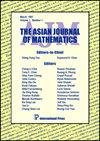多项式积分微分算子代数的广义权模的显式描述$\mathbb{I}_n$
IF 0.5
4区 数学
Q3 MATHEMATICS
引用次数: 0
摘要
对于特征为零的域$K$上多项式积分微分算子的代数$\mathbb{I}_n = K {\langle x_1, \dotsc, x_n, \partial_1, \dotsc, \partial_n, \int_1, \dotsc, \int_n \rangle}$,给出了简单权(左)和广义权(右)$\mathbb{I}_n$ -模的分类。证明了权重$\mathbb{I}_n$ -模的范畴是半简单的。给出了广义权$\mathbb{I}_n$ -模的显式描述,并利用它得到了不可分解广义权$\mathbb{I}_n$ -模的分类问题是有限表示型、驯服型或野生型的一个准则。在一般情况下,给出了不可分解广义权$\mathbb{I}_n$ -模的分类。在野生情况下,“自然”驯服子类别被认为具有不可分解模块的显式描述。对于任意环$R$,我们引入了绝对素数$R$ -模的概念(如果$M$的所有非零子因子具有相同的湮灭子,则非零$R$ -模$M$是绝对素数)。证明了每一个广义权$\mathbb{I}_n$ -模都是绝对素模的唯一和。还证明了每个不可分解广义权$\mathbb{I}_n$ -模都是等维的。给出了有限生成广义权重$\mathbb{I}_n$ -模块的准则。本文章由计算机程序翻译,如有差异,请以英文原文为准。
Explicit description of generalized weight modules of the algebra of polynomial integro-differential operators $\mathbb{I}_n$
For the algebra $\mathbb{I}_n = K {\langle x_1, \dotsc, x_n, \partial_1, \dotsc, \partial_n, \int_1, \dotsc, \int_n \rangle}$ of polynomial integrodifferential operators over a field $K$ of characteristic zero, a classification of simple weight and generalized weight (left and right) $\mathbb{I}_n$‑modules is given. It is proven that the category of weight $\mathbb{I}_n$‑modules is semisimple. An explicit description of generalized weight $\mathbb{I}_n$‑modules is given and using it a criterion is obtained for the problem of classification of indecomposable generalized weight $\mathbb{I}_n$‑modules to be of finite representation type, tame or wild. In the tame case, a classification of indecomposable generalized weight $\mathbb{I}_n$‑modules is given. In the wild case ‘natural‘ tame subcategories are considered with explicit description of indecomposable modules. For an arbitrary ring $R$, we introduce the concept of absolutely prime $R$‑module (a nonzero $R$‑module $M$ is absolutely prime if all nonzero subfactors of $M$ have the same annihilator). It is proven that every generalized weight $\mathbb{I}_n$‑module is a unique sum of absolutely prime modules. It is also shown that every indecomposable generalized weight $\mathbb{I}_n$‑module is equidimensional. A criterion is given for a generalized weight $\mathbb{I}_n$‑module to be finitely generated.
求助全文
通过发布文献求助,成功后即可免费获取论文全文。
去求助
来源期刊
CiteScore
1.00
自引率
0.00%
发文量
0
审稿时长
>12 weeks
期刊介绍:
Publishes original research papers and survey articles on all areas of pure mathematics and theoretical applied mathematics.

 求助内容:
求助内容: 应助结果提醒方式:
应助结果提醒方式:


